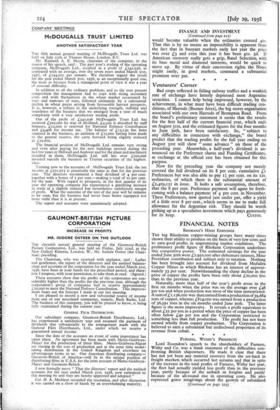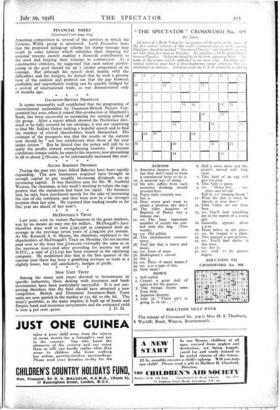FINANCIAL NOTES
RHOKANA'S HIGH EARNINGS THE big Rhodesian copper-mining groups have many times shown their ability to produce on the basis of very low costs and to earn good profits in unpromising market conditions. The preliminary profit figure of Rhokana Corporation underlines this competitive power. The estimated earnings for the year ended June 3oth were £1,950,0043 after debenture interest, Mine Provident contribution and subject only to taxation. Nothing has been brought into account for dividend from Mufulira Copper Mines in which Rhokana has an interest of approxi- mately 33 per cent. Notwithstanding the sharp decline in the price of copper the profits have been only about £20,000 less than in the previous year.
Naturally, more than half of the year's profit arose in the first six months when the price was on the average over £48 per ton and when production was most of the time unrestricted. A sum of LI,136,000 was then earned from a production of 39,684 tons of copper, whereas £814,000 was earned from a production of 36,591 tons in the six months ended June 3oth. The latter figure is the more impressive. It reveals a profit equivalent to about £22 per ton in a period when the price of copper has been often below £40 per ton and the Corporation restricted to something less than full production. The profit has not been earned wholly from copper production. The Corporation is believed to earn a substantial but undisclosed proportion of its revenue from cobalt.
* * * * -
FURNESS, WITHY'S PROSPECTS Lord Essendon's speech to the shareholders of Furness, Withy and Co. was a frank statement of the difficulties con- fronting British shipowners. He made it clear that there has not yet been any material recovery from the set-back in freight markets which occurred last autumn and that in spite of the increase in the total profits of Furness, Withy last year, the fleet had actually yielded less profit than in the previous year, partly because of the setback in freights and partly because of the all-round rise in operating costs. He also expressed grave misgivings about the growth of subsidised
(Continued on page 215) FINANCIAL NOTES.
* * * * GAUMONT-BRITISH PROSPECTS
It seems reasonably well established that the programme of retrenchment undertaken by Gaumont-British Picture Cor- poration last year, when it ceased film-production at Shepherd's Bush, has been successful in sustaining the earning power of the group. After a report which showed the Preference divi- dend to be fully covered by net earnings, it was not surprising to find Mr. Isidore Ostrer making a hopeful speech and to find the number of critical shareholders much diminished. His estimate of the prospects was that the results of the current year should be " not less satisfactory than those of the year under review." But he hinted that the policy will still be to apply the profits toward strengthening reserves. If present conditions remain stable, he expects the reserves, now amounting
in all to about £780,000, to be substantially increased this year. * * * *
ALLIED BAKERIES PROGRESS
During the past two years Allied Bakeries have been rapidly expanding. The new businesses acquired have brought in enough capital to pay steadily increasing dividends on an increasing capital. It was therefore easy for Mr. W. Garfield Weston, the chairman, at last week's meeting to refute the sug- gestion that the expansion had been too rapid. No business had, he said, been purchased merely for the sake of increasing the size of the company, and they were now in a far stronger position than last year. He reported that trading results so far this year are ahead of last year's. * * * *
MCDOUGALL'S TRUST
Last year, with its violent fluctuations in the grain markets, was by no means an easy one for millers. McDougall's have therefore done well to earn £241,036 as compared with an average in the previous seven years of £194,000 per annum. As Mr. Kenneth A. E. Moore, the chairman, explained to the shareholders of McDougall's Trust on Monday, the net income paid over to the trust was kzoz,000-virtually the same as in the previous year-and after providing for income tax and N.D.C., a sum of £13i130 has been retained in the operating company. He mentioned also that in the first quarter of the current year there has been a gratifying increase in trade at a slightly lower, but still satisfactory, margin of profit. * * * *
NEW UNIT TRUST
Among the many unit trusts devoted to investments in specific industries, those dealing with insurance and bank investments have been particularly successful. It is not sur- prising therefore that the field should have attracted a new competitor. British and Dominion Insurance-Bank Trust units are now quoted in the market at 15s. 6d. to 16s. 6d. The truit's portfolio, as the name implies, is built up of home and Empire bank and insurance investments and the estimated yield
(Continued from page 214)
American competition in several of the services in which the Furness, Withy group is interested. Lord Essendon fears that the proposed laying-up scheme for tramp tonnage may result in some nations which subsidise their shipping for national reasons merely making a financial contribution to the pool and keeping their tonnage in commission. As a constructive criticism, he suggested that each nation partici- pating in the pool should lay up a similar proportion of its tonnage. But although his speech dealt mainly with the difficulties and the dangers, he denied that he took a gloomy view of the outlook and pointed out that the gap between profitable and unprofitable trading can be quickly bridged by a revival of international trade, as was demonstrated only 18 months ago.



































 Previous page
Previous page